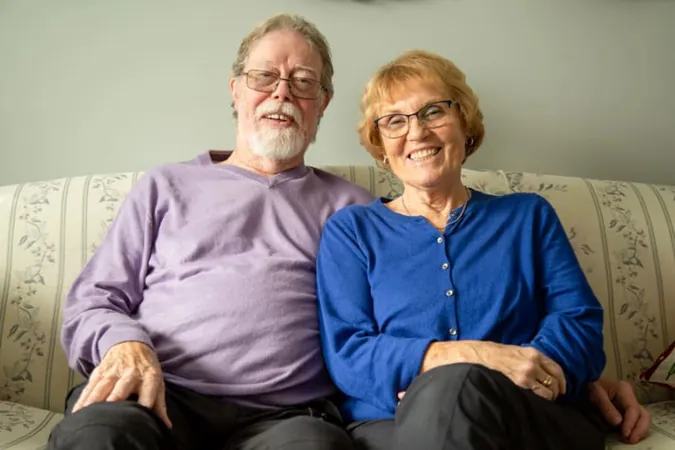
Stroke Survivor’s Inspiring Journey Influences Global Care Standards!
2024-12-06
Author: Charlotte
Stroke Survivor’s Inspiring Journey Influences Global Care Standards!
In a remarkable story of resilience and hope, Paul Brady, an 84-year-old stroke survivor, is not only focusing on his recovery but is also playing a vital role in shaping the future of stroke care worldwide. Fourteen years ago, when Brady suffered a stroke, he was put on blood thinners, believing they'd be part of his lifelong routine. However, a fall last year led him back to the hospital — and this time, it would change the course of his treatment forever.
Last year, Brady became one of the pioneering patients in Niagara Health's neurology research program, driven by the innovative work of stroke neurologist, Dr. Danielle de Sa Boasquevisque. He is currently participating in the ENRICH-AF clinical trial, a pivotal global study evaluating the effectiveness of edoxaban, a newer blood thinner, in reducing the overall stroke risk for patients with atrial fibrillation (AFib), particularly those with a history of brain bleeding. The objective? Determine if edoxaban can minimize risks of further bleeding compared to traditional treatments, typically aspirin.
Brady, who hails from Ireland, endured a stroke at the age of 70, compounded by his AFib diagnosis. This condition, characterized by an irregular heartbeat, can lead to blood clots — essentially a ticking time bomb for potential strokes. Despite his challenges, Brady returned to normal life, enjoying his passion for music by playing guitar and singing in a band, alongside his role as a school bus monitor.
However, everything changed in July 2023 when Brady experienced a severe fall that resulted in a hematoma, or pooling of blood in the brain. His treatment plan was challenged when initial scans led doctors to stop his blood thinners. Unfortunately, after resuming the medication, Brady faced troubling side effects, including extreme fatigue and disorientation.
“That’s when we sought out more answers,” recalled Margaret, Brady’s wife. Their persistence paid off when Dr. de Sa Boasquevisque intervened after examining Brady's CT scan results. She promptly advised him to cease blood thinners temporarily while the situation was reassessed. The timing of resuming medication was crucial and must be tailored for each individual case.
Brady's subsequent hospital stay allowed for medical professionals to drain the hematoma, and upon returning to Niagara Falls Hospital, he was invited to partake in the groundbreaking ENRICH-AF study. This trial represents a significant stride in Niagara Health's research endeavors, which now includes six active studies under Dr. de Sa Boasquevisque's leadership.
What makes this trial unique? The evaluation of edoxaban is being conducted across 250 to 300 global sites over three years, aiming to refine how this medication could become the new standard of care for AFib patients.
"I felt it was a great opportunity," said Margaret. "Seeing him involved in the trial means he'll receive close monitoring and cutting-edge care."
As a trial participant, Brady will meet with Dr. de Sa Boasquevisque and the research team semi-annually. This relationship fosters not just clinical oversight but genuine connections, enhancing the patients’ sense of purpose. Dr. de Sa Boasquevisque remarked, "Patients participating in research trials are inherently special; they often have goals of helping others while facing their own health challenges."
The Niagara Health Knowledge Institute (NHKI) is overseeing a variety of clinical trials, including those in cardiology, oncology, and critical care. Such initiatives provide local patients access to groundbreaking treatments earlier than they would typically experience elsewhere, ensuring that communities have access to innovations in medical care.
As Brady continues to regain his strength, he remains dedicated to both his health and the betterment of future treatments for stroke patients worldwide.
“Someone must step forward for the studies,” Margaret affirmed to Brady, summarizing not only his role in the trial but the importance of collective efforts in advancing medical research. “This isn’t just benefitting you; it’s helping countless others.”
Stay tuned as Brady and the medical community continue their incredible journey toward redefining stroke treatment standards globally!









 Brasil (PT)
Brasil (PT)
 Canada (EN)
Canada (EN)
 Chile (ES)
Chile (ES)
 España (ES)
España (ES)
 France (FR)
France (FR)
 Hong Kong (EN)
Hong Kong (EN)
 Italia (IT)
Italia (IT)
 日本 (JA)
日本 (JA)
 Magyarország (HU)
Magyarország (HU)
 Norge (NO)
Norge (NO)
 Polska (PL)
Polska (PL)
 Schweiz (DE)
Schweiz (DE)
 Singapore (EN)
Singapore (EN)
 Sverige (SV)
Sverige (SV)
 Suomi (FI)
Suomi (FI)
 Türkiye (TR)
Türkiye (TR)